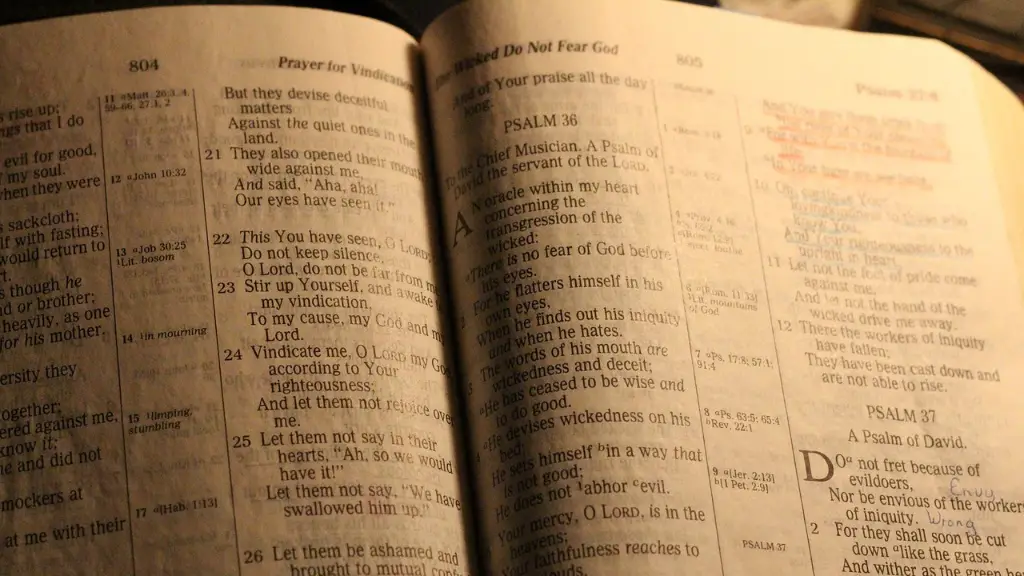What Does Iniquity Mean In The Bible
The bible talks about iniquity quite extensively, yet it is one of the most overlooked concepts in biblical study. Iniquity is expressed as a problem that plagues humanity, from the Garden of Eden to End Times. From the New Testament to the Old Testament, iniquity is a major theme in the bible. But what does it mean?
The dictionary definition of iniquity is “immoral or wicked behaviour; gross injustice or wickedness.” However, when we consider the theological definition, the concept becomes much more complex. In the bible, iniquity describes any behaviour or thought that goes against what is ordained by God. It is an act of transgression against His divine laws; a sin.
Iniquity is both a “cause” and a “result” of sin. All sin is iniquity, but not all iniquity is sin. Sin is an action, while iniquity is a heart issue. In other words, iniquity is the wickedness of our hearts that leads us to sin. It originates from within, and causes an inner desire to do evil. It is not just the violations and transgressions of God’s commands, it is any and all thoughts, emotions, and intentions that contradict His will.
The bible highlights iniquity in many different forms all through its pages. Adam and Eve’s transgression in the Garden of Eden was an act of iniquity as was Esau’s attempt to deceive his father, Isaac. In the New Testament, iniquity is exemplified by Judas Iscariot’s betrayal of Jesus. In Matthew, Jesus states that iniquity is a fruit of the human heart. It is the source of all the struggles, sorrows and sins of life, the source of evil and disorder in the world.
Thankfully, God offers deliverance from iniquity through His son, Jesus. According to Paul, the wages of sin is death, the penalty of iniquity is the Cross. When we accept Jesus’ sacrifice we receive forgiveness from God and become free from the penalty of our iniquities. 1 John 1:9 offers us peace and assurance on this point: “If we confess our sins, He is faithful and just to forgive us our sins and to cleanse us from all unrighteousness.”
The Bible’s Teachings on Iniquity
That the bible persistently addresses iniquity suggests that it is a concept that needs to be taken seriously. Biblical writers strongly emphasize the dangers of iniquity. The Old Testament book of Habakkuk lists five disasters that were caused by iniquity, including poverty, plunder, oppression and injustice. The prophet Isaiah also speaks of iniquity and how it leads to stagnation and inner decay. His words highlight our vulnerability to iniquity and the importance of taking steps to confront it.
The bible also makes it abundantly clear that iniquity brings about a curse. A person’s iniquity affects the larger community, leading to a breakdown of the social order. Proverbs 20:22 says “Do not say, ‘I will repay evil’; wait for the Lord, and he will deliver you.” This verse implies that when individuals try to pay back evil with evil, they will get cursed and be further separated from God’s presence.
Iniquity is a difficult concept to grasp, particularly given our fallen nature. It is easy to have a surface level understanding of iniquity, while underestimating its true nature and the depths of its consequences. The bible reveals a greater truth that iniquity is contagious, leading to further sin and death.
However, the bible is not pessimistic about our capacity to overcome iniquity. God has not abandoned us, but offers strength and reassurance through His word. In Ezekiel 18:4, God declares: “Behold, all souls are mine; the soul of the father as well as the soul of the son is mine. The soul who sins shall die.” It is a reminder that God is the ultimate judge, and that we will be held accountable for our wrong doings.
The Effects of Iniquity
Iniquity has far-reaching effects that touch individuals, families, communities and nations. It threatens our peace, security and well-being, bringing judgment and destruction. Bible passages warn rulers and leaders that their iniquity could lead to punishment and exile. They also serve as admonishments to the people that they should not be swayed by wicked rulers or follow in their footsteps.
The bible also speaks of the effects of iniquity on individuals. In Psalm 14:3, the psalmist writes: “All have turned aside; together they have become corrupt; there is none who does good, not even one.” This suggests that human sinfulness results in spiritual death and estrangement from God’s covenant. This can cause serious psychological distress.
Iniquity also has spiritual implications. It can result in a sense of guilt and shame, leading to lack of self-confidence and apathy. Such a mindset can make it difficult to accept God’s loving grace and pardon, creating an internal conflict and tension between our true identity and our behaviour.
These are the heavy realities of iniquity that the bible talks about. It is not something to be taken lightly, but something to take seriously. Iniquity needs to be confronted and repented of and we need to plead for God’s grace and mercy.
Jesus as an Answer to Iniquity
Jesus is the only one that can rescue us from iniquity. He died on the cross to save us from any and all sin and iniquity, and to reconcile us with God. Jesus said in Mark 2:17 “It is not the healthy who need a doctor, but the sick. I have not come to call the righteous, but sinners.” He offers us hope, healing, and redemption from sin and iniquity.
The psalmist in Psalm 130:3–4 expresses our need for redemption as “If you, O Lord, kept a record of sins, Lord, who could stand? But with you there is forgiveness; therefore you are feared.” As we plead for His mercy and grace, He grants us the forgiveness that we need to break free from the power of iniquity. This is not empty forgiveness, but forgiveness that comes with healing, restoration and renewal.
It is important to remember that God offers us redemption from iniquity and not just from our sins. Our God is a God of mercy and grace, and He offers us the power of redemption not just from the obvious vices, but from the root of all evil – iniquity. He provides the kind of grace that is rooted in divine love and seeks to bring spiritual transformation to our lives.
Our Own Response to Iniquity
How then should we respond to iniquity? We must first recognise God as the one true judge who ultimately decides our fate. Secondly, we must accept His free and unconditional love and forgiveness. We need to take an active role in confronting our iniquity and repenting of our sins. We must seek the help of God and the guidance of the Holy Spirit to transform our lives and help us to walk in holiness and righteousness.
The bible warns us of the dangers of iniquity, but also holds out hope that with God’s help, transformation is possible. We can break free from the power of iniquity and live in freedom and righteousness. But it is up to us to decide to accept God’s offer of grace and forgiveness and to take the necessary steps to seek liberation from the power of sin and iniquity.
Living in Freedom From Iniquity
When we do accept God’s love and forgiveness, we experience a freedom from iniquity that can only be described as liberation. We can become agents of God’s grace, spreading the gospel and showing others how to break free from the grip of sin and iniquity. This will require hard work, dedication and a willingness to confront our own struggles with iniquity, alongside a humble and trusting reliance on God’s love.
The bible tells us that we will struggle with iniquity, but that God grants us the light of His Word and the power of His Spirit to confront it. Jesus offers us forgiveness, redemption and liberation from sin and iniquity. All we must do is accept it. When we do, we experience the freedom to live according to God’s will, in righteousness and peace.
Third-Party Perspectives on Iniquity
Iniquity is a complex issue that theologians, dating all the way back to St. Augustine’s thoughts on iniquity 500 years ago, have debated for centuries. Academic researchers now refer to it as a “moral justice concept”, referring to any form of unethical behaviour and malicious intentions that go against the values of a particular society or faith.
In modern society, there is a great deal of talk about oppression, privilege and injustice in the light of social movements such as #MeToo and Black Lives Matter. For experts in this field, iniquity is one way to describe a problem that has arisen out of a balance of power between different social groups and systems. Dr. Jane Doe, a theological professor who studies iniquity, says “Iniquity is not just a personal sin, but a collective one. We need to look at the systems of injustice that are still in place in society and work towards dismantling them.”
This perspective highlights the importance of understanding iniquity in the context of our modern world. It also reflects the biblical perspective on iniquity that looks at both personal sins and collective sins.
Coping Strategies for Iniquity
It is important for individuals to understand their own struggles with iniquity and to take active steps to address it. It starts with an honest assessment of our own attitudes and behaviours. Are we seeing the world through the eyes of love and humility? Do we value righteousness and justice over our own pride and judgmentalism? Once we identify our own shortcomings and biases, it becomes easier to take action to address them.
We must rely on God for strength and wisdom in our struggle against iniquity. It is only when we open our hearts to His presence and grace that we will be able to truly overcome our inner desires and perform acts of righteousness. As Bible believers, we should also make use of the tremendous strength and courage of fellow believers to support us in our journey towards freedom from iniquity.
Community and accountability are also important tools when it comes to breaking free from iniquity. We should look to our church and spiritual communities to help us in our journey towards hol





